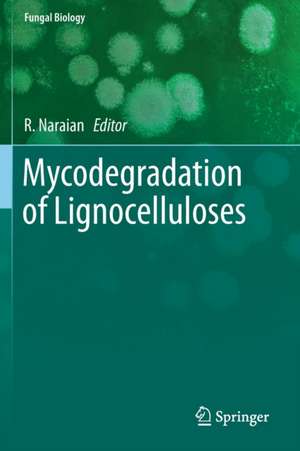Mycodegradation of Lignocelluloses: Fungal Biology
Editat de R. Naraianen Limba Engleză Paperback – 29 oct 2020
| Toate formatele și edițiile | Preț | Express |
|---|---|---|
| Paperback (1) | 942.94 lei 6-8 săpt. | |
| Springer International Publishing – 29 oct 2020 | 942.94 lei 6-8 săpt. | |
| Hardback (1) | 948.92 lei 6-8 săpt. | |
| Springer International Publishing – 29 oct 2019 | 948.92 lei 6-8 săpt. |
Din seria Fungal Biology
- 18%
 Preț: 1122.72 lei
Preț: 1122.72 lei - 15%
 Preț: 658.22 lei
Preț: 658.22 lei - 18%
 Preț: 1110.72 lei
Preț: 1110.72 lei - 20%
 Preț: 544.49 lei
Preț: 544.49 lei - 18%
 Preț: 948.61 lei
Preț: 948.61 lei - 18%
 Preț: 960.42 lei
Preț: 960.42 lei - 24%
 Preț: 1074.47 lei
Preț: 1074.47 lei - 18%
 Preț: 1228.96 lei
Preț: 1228.96 lei - 15%
 Preț: 635.01 lei
Preț: 635.01 lei - 18%
 Preț: 1403.98 lei
Preț: 1403.98 lei - 18%
 Preț: 1117.99 lei
Preț: 1117.99 lei - 15%
 Preț: 657.57 lei
Preț: 657.57 lei - 18%
 Preț: 958.88 lei
Preț: 958.88 lei - 18%
 Preț: 951.77 lei
Preț: 951.77 lei - 18%
 Preț: 957.75 lei
Preț: 957.75 lei - 18%
 Preț: 1112.15 lei
Preț: 1112.15 lei - 18%
 Preț: 998.34 lei
Preț: 998.34 lei - 18%
 Preț: 954.93 lei
Preț: 954.93 lei - 18%
 Preț: 1117.99 lei
Preț: 1117.99 lei - 18%
 Preț: 1120.18 lei
Preț: 1120.18 lei - 15%
 Preț: 643.34 lei
Preț: 643.34 lei - 15%
 Preț: 640.71 lei
Preț: 640.71 lei - 18%
 Preț: 951.14 lei
Preț: 951.14 lei - 18%
 Preț: 948.92 lei
Preț: 948.92 lei - 15%
 Preț: 644.95 lei
Preț: 644.95 lei - 18%
 Preț: 1844.67 lei
Preț: 1844.67 lei - 18%
 Preț: 947.67 lei
Preț: 947.67 lei - 18%
 Preț: 1111.67 lei
Preț: 1111.67 lei - 18%
 Preț: 1010.65 lei
Preț: 1010.65 lei - 18%
 Preț: 953.35 lei
Preț: 953.35 lei - 18%
 Preț: 959.19 lei
Preț: 959.19 lei - 15%
 Preț: 645.28 lei
Preț: 645.28 lei
Preț: 942.94 lei
Preț vechi: 1149.93 lei
-18% Nou
Puncte Express: 1414
Preț estimativ în valută:
180.43€ • 188.89$ • 149.29£
180.43€ • 188.89$ • 149.29£
Carte tipărită la comandă
Livrare economică 05-19 aprilie
Preluare comenzi: 021 569.72.76
Specificații
ISBN-13: 9783030238360
ISBN-10: 3030238369
Pagini: 252
Ilustrații: VIII, 252 p. 30 illus., 20 illus. in color.
Dimensiuni: 155 x 235 mm
Greutate: 0.37 kg
Ediția:1st ed. 2019
Editura: Springer International Publishing
Colecția Springer
Seria Fungal Biology
Locul publicării:Cham, Switzerland
ISBN-10: 3030238369
Pagini: 252
Ilustrații: VIII, 252 p. 30 illus., 20 illus. in color.
Dimensiuni: 155 x 235 mm
Greutate: 0.37 kg
Ediția:1st ed. 2019
Editura: Springer International Publishing
Colecția Springer
Seria Fungal Biology
Locul publicării:Cham, Switzerland
Cuprins
Preface.- Compositional biochemistry of lignocellulosic resources and an overview of their Mycodegradation.- Basic principle and mechanism of lignocellulosic Mycodegradation.- Efficient fungal enzyme system working in mycodegradation of lingo celluloses.- Fungal biodiversity producing cellulose involved in efficient cellulolysis.- Fungal biodiversity producing laccase and peroxidase involved in efficient ligninolysis.- Fungal biodiversity producing enzymes involved in efficient xylanolysis.- Fungal cellulase system and mechanism of cellulolysis during Mycodegradation.- Fungal pectinase system and mechanism of pectinolysis during Mycodegradation.- Strategic role of lactases during mycodegradation of lignocelluloses.- Application of mycodegradation in mushroom production. Selective mycodegradation of lignin in paper and pulp industry.- Mycodegradation and bioconversion of lignocelluloses into bioactive compounds.- Fungal digestion/treatment of lignocelluloses for nutritious animal fodder.- Fungal hydrolysis and saccharification of lignocellulosic wastes for bioethanol production.- Application of mycodegradation in production of secondary metabolites.- Mycodegradation of lignocelluloses and release of common metabolites.- Multiple factors influencing the strategy of Mycodegradation.- Bioconversion of lignocelluloses into nutrient rich Agaricus mushroom.- Index.
Notă biografică
Dr. Ram Naraian
Department of Biotechnology, Faculty of Sciences
Veer Bahadur Singh Purvanchal University, Jaunpur, (Uttar Pradesh) India
ramnarain_itrc@rediffmail.com
+91-9453095777
Textul de pe ultima copertă
This book provides a knowledge-based view to the dynamic capabilities in an organization. The author integrates two existing views on gaining competitive advantage: the Knowledge View which suggests that the capability of organizations to learn faster than competitors is the only source of competitiveness; and the Dynamic Capability View which speculates that a fi rm’s competitive advantage rests on it’s ability to adapt to changes in the business environment. Using the IT sector in India as a case study, this book provides and tests a new framework—Knowledge-Based Dynamic Capabilities—in the prediction of competitive advantage in organizations.
Caracteristici
Written by a collection of leading authorities from around the world The latest information and technology used by practicing members from societies such as the American Society of Mycology, the Association of Microbiologists of India, Mycological Society of India, and several other professional organizations including the private and governmental sectors Generously illustrated with examples that clarify the text Fully indexed and referenced for further reading.
